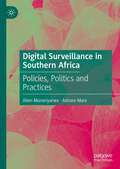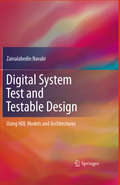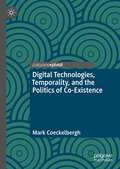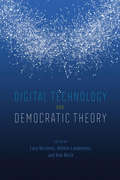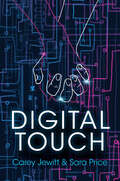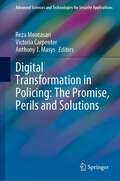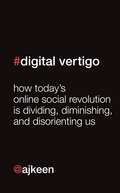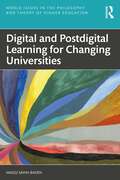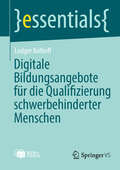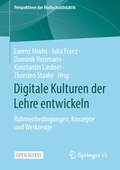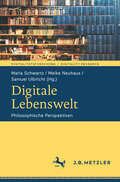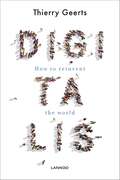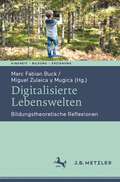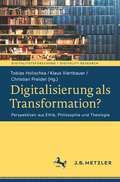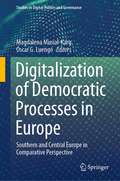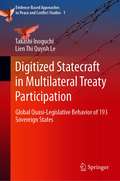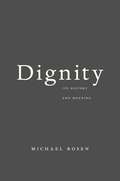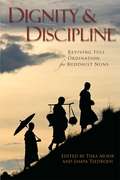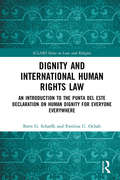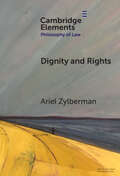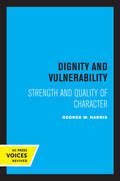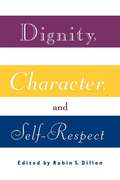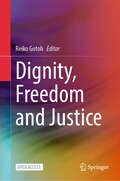- Table View
- List View
Digital Stockholm Syndrome in the Post-Ontological Age (Forerunners: Ideas First)
by Mark JarzombekOnce, humans were what they believed. Now, the modern person is determined by data exhaust—an invisible anthropocentric ether of ones and zeros that is a product of our digitally monitored age. Author Mark Jarzombek argues that the world has become redesigned to fuse the algorithmic with the ontological, and the discussion of ontology must be updated to rethink the question of Being. In Digital Stockholm Syndrome in the Post-Ontological Age, Jarzombek provocatively studies the new interrelationship between human and algorithm. Forerunners is a thought-in-process series of breakthrough digital works. Written between fresh ideas and finished books, Forerunners draws on scholarly work initiated in notable blogs, social media, conference plenaries, journal articles, and the synergy of academic exchange. This is gray literature publishing: where intense thinking, change, and speculation take place in scholarship.
Digital Surveillance in Southern Africa: Policies, Politics and Practices
by Admire Mare Allen MunoriyarwaThis book critically examines the manifest and latent practices of surveillance in the southern African region, using case studies from South Africa, Zimbabwe, Zambia, Namibia, Botswana and Mozambique. The book demonstrates the growing role of super-powers in the construction and normalization of the surveillance state. It traces the digitization of surveillance practices to the rapid adoption of smart CCTV, facial recognition technologies and EMSI catchers. Through predictive policing mechanisms, state security agencies have appropriated digital media technologies for sentiment analysis, constant monitoring of digital footprints of security targets, and even deploying cyber-troops on popular social media platforms. The authors argue that surveillance practices have thus been digitized with deleterious impact on the right to privacy, peaceful assembly and freedom of expression in the region. Furthermore, they argue that specific laws and regulations governing surveillance practices in the region are lagging behind. Finally, the book demonstrates how digital surveillance have significantly infiltrated the political, economic and social fabric of Southern Africa. This book provides much needed systematic, cutting-edge research into the trends, practices, policies and geo-political interests at the center of surveillance practices in the region, providing a crucial link between human rights, such as freedom of privacy and expression, and political authoritarianism.
Digital System Test and Testable Design
by Zainalabedin NavabiThis book is about digital system testing and testable design. The concepts of testing and testability are treated together with digital design practices and methodologies. The book uses Verilog models and testbenches for implementing and explaining fault simulation and test generation algorithms. Extensive use of Verilog and Verilog PLI for test applications is what distinguishes this book from other test and testability books. Verilog eliminates ambiguities in test algorithms and BIST and DFT hardware architectures, and it clearly describes the architecture of the testability hardware and its test sessions. Describing many of the on-chip decompression algorithms in Verilog helps to evaluate these algorithms in terms of hardware overhead and timing, and thus feasibility of using them for System-on-Chip designs. Extensive use of testbenches and testbench development techniques is another unique feature of this book. Using PLI in developing testbenches and virtual testers provides a powerful programming tool, interfaced with hardware described in Verilog. This mixed hardware/software environment facilitates description of complex test programs and test strategies.
Digital Technologies, Temporality, and the Politics of Co-Existence
by Mark CoeckelberghOur digital existence is hurried and fast. We are tied to the present, or perhaps we are not present enough: immersed in digital social media and processes by artificial intelligence, we are hardly present to ourselves and to others, and feel alienated from nature. We are also made to fear climate change and the end of humanity. How can we live a good life and give meaning to our lives under these conditions? How can and should we co-exist today?Using process philosophy, narrative theory, and the concept of technoperformances, this book analyzes how digital technologies shape our relation to time and our existence, and discusses what this means in the light of climate change and new technologies such as AI. In dialogue with contemporary philosophy of technology and media theory and asking original questions about finding common times in what it calls the “Anthropochrone”, it proposes a conceptual framework that helps us to understand how we (should) exist and relate to time today.
Digital Technology and Democratic Theory
by Hélène Landemore Rob Reich Lucy BernholzOne of the most far-reaching transformations in our era is the wave of digital technologies rolling over—and upending—nearly every aspect of life. Work and leisure, family and friendship, community and citizenship have all been modified by now-ubiquitous digital tools and platforms. Digital Technology and Democratic Theory looks closely at one significant facet of our rapidly evolving digital lives: how technology is radically changing our lives as citizens and participants in democratic governments. To understand these transformations, this book brings together contributions by scholars from multiple disciplines to wrestle with the question of how digital technologies shape, reshape, and affect fundamental questions about democracy and democratic theory. As expectations have whiplashed—from Twitter optimism in the wake of the Arab Spring to Facebook pessimism in the wake of the 2016 US election—the time is ripe for a more sober and long-term assessment. How should we take stock of digital technologies and their promise and peril for reshaping democratic societies and institutions? To answer, this volume broaches the most pressing technological changes and issues facing democracy as a philosophy and an institution.
Digital Touch
by Carey Jewitt Sara PriceTouch matters. It is fundamental to how we know ourselves and each other, and it is central to how we communicate. Digital touch is embedded in many technologies, from wearable devices and gaming hardware to tactile robots and future technologies. What would it be like if we could hug or touch digitally across distance? How might this shape our sense of connection? How might we establish trust or protect our privacy and safety? Digital Touch is a timely and original book that addresses such questions. Offering a rich account of digital touch, the book introduces the key issues and debates, as well as the design and ethical challenges raised by digital touch. Using clear, accessible examples and creative scenarios, the book shows how touch – how we touch, as well as what, whom and when we touch – is being profoundly reshaped by our use of technologies. Above all, it highlights the importance of digital touch in our daily lives and how it will impact our relationships and way of life in the future. The first work of its kind, Digital Touch is the go-to book for anyone wanting to get to grips with this crucial emerging topic, especially students and scholars of Digital Media and Communication Studies, Digital Humanities, Sensory Studies, and Science and Technology Studies.
Digital Transformation in Policing: The Promise, Perils and Solutions (Advanced Sciences and Technologies for Security Applications)
by Anthony J. Masys Reza Montasari Victoria CarpenterThis book shares essential insights into how the social sciences and technology could foster new advances in managing the complexity inherent to the criminal and digital policing landscape. Said landscape is both dynamic and intricate, emanating as it does from crimes that are both persistent and transnational. Globalization, human and drug trafficking, cybercrime, terrorism, and other forms of transnational crime can have significant impacts on societies around the world. This necessitates a reassessment of what crime, national security and policing mean. Recent global events such as human and drug trafficking, the COVID-19 pandemic, violent protests, cyber threats and terrorist activities underscore the vulnerabilities of our current security and digital policing posture.This book presents concepts, theories and digital policing applications, offering a comprehensive analysis of current and emerging trends in digital policing. Pursuing an evidence-based approach, it offers an extraordinarily perceptive and detailed view of issues and solutions regarding the crime and digital policing landscape. To this end, it highlights current technological and methodological solutions as well as advances concerning integrated computational and analytical solutions deployed in digital policing. It also provides a comprehensive analysis of the technical, ethical, legal, privacy and civil liberty challenges stemming from the aforementioned advances in the field of digital policing; and accordingly, offers detailed recommendations supporting the design and implementation of best practices including technical, ethical and legal approaches when conducting digital policing. The research gathered here fits well into the larger body of work on various aspects of AI, cybersecurity, national security, digital forensics, cyberterrorism, ethics, human rights, cybercrime and law. It provides a valuable reference for law enforcement, policymakers, cybersecurity experts, digital forensic practitioners, researchers, graduates and advanced undergraduates, and other stakeholders with an interest in counter-terrorism. In addition to this target audience, it offers a valuable tool for lawyers, criminologist and technology enthusiasts.
Digital Vertigo (FREE Extended Extract): How today's online social revolution is dividing, diminishing and disorienting us
by Andrew KeenThis an Extended Extract of Digital Vertigo to be published on May 22nd 2012. You can follow Andrew Keen: @ajkeenIn Digital Vertigo, Andrew Keen presents today's social media revolution as the most wrenching cultural transformation since the Industrial Revolution. Fusing a fast-paced historical narrative with front-line stories from today's online networking revolution and critiques of "social" companies like Groupon, Zynga and LinkedIn, Keen argues that the social media transformation is weakening, disorienting and dividing us rather than establishing the dawn of a new egalitarian and communal age. The tragic paradox of life in the social media age, Keen says, is the incompatibility between our internet longings for community and friendship and our equally powerful desire for online individual freedom. By exposing the shallow core of social networks, Andrew Keen shows us that the more electronically connected we become, the lonelier and less powerful we seem to be.
Digital Vertigo: How Today's Online Social Revolution Is Dividing, Diminishing, and Disorienting Us
by Andrew KeenIn Digital Vertigo, Andrew Keen presents today's social media revolution as the most wrenching cultural transformation since the Industrial Revolution. Fusing a fast-paced historical narrative with front-line stories from today's online networking revolution and critiques of "social" companies like Groupon, Zynga and LinkedIn, Keen argues that the social media transformation is weakening, disorienting and dividing us rather than establishing the dawn of a new egalitarian and communal age.The tragic paradox of life in the social media age, Keen says, is the incompatibility between our internet longings for community and friendship and our equally powerful desire for online individual freedom. By exposing the shallow core of social networks, Andrew Keen shows us that the more electronically connected we become, the lonelier and less powerful we seem to be.Praise forThe Cult of the Amateur:'A shrewdly argued jeremiad against the digerati effort to dethrone cultural and political gatekeepers and replace experts with 'the wisdom of the crowd'. Keen writes with acuity and passion'. New York Times'A staggering new book by Andrew Keen. He is an English-born digital media entrepreneur and Silicon Valley insider who really knows his stuff and he writes with the passion of a man who can at last see the dangers he has helped unleash. His book will come as a real shock to many. It certainly did to me'. A N Wilson, The Daily Mail
Digital and Postdigital Learning for Changing Universities (World Issues in the Philosophy and Theory of Higher Education)
by Maggi Savin-BadenThis book explores the purpose, role and function of the university and examines the disconnection between students’ approaches to learning and university strategy. It centres on the idea that it is vital to explore what counts as a university in the twenty-first century, what it is for, and for whom, as well as how it can transcend social divisions. The universities of the twenty-first century need to have larger audiences, a broader voice, a shift away from othering and an effective means of progressing such shifts. What is central to such exploration is the idea that learning needs to be seen as postdigital. With a focus on how the growth of technology has and continues to affect university learning, this book: explores the concepts of the digital and the postdigital; promotes just and inclusive pedagogies for higher education; considers ways to ensure learning is an ethical and political experience; studies how to understand community and collective values through higher education; suggests ways of promoting personal and collective responsibility for our world and its peoples; presents ways in which the university can challenge ideologies based on capitalist modes of consumption, privilege and exploitation. Digital and Postdigital Learning for Changing Universities is essential reading for anyone seeking to reimagine the university in a postdigital age, despite institutional structuration and government intervention. It challenges current assumptions and practices, and encourages new ways of thinking about higher education and learning in the twenty-first century.
Digitale Bildungsangebote für die Qualifizierung schwerbehinderter Menschen (essentials)
by Ludger KolhoffDigitale Bildung für schwerbehinderte Menschen bietet neue Chancen zur Erweiterung beruflicher Qualifikationen und zur Stärkung der Teilhabe am Arbeitsmarkt. Doch wie lassen sich digitale Bildungsangebote in Einrichtungen der Behindertenhilfe erfolgreich umsetzen? Welche Herausforderungen gibt es, und welche Lösungen ermöglichen eine gleichberechtigte Nutzung?Dieses Buch stellt praxisnahe Konzepte, wissenschaftliche Erkenntnisse und konkrete Handlungsempfehlungen vor, die auf einem Modellprojekt basieren. Dabei werden die Perspektiven von Behindertenhilfe, Arbeitgebern und Betroffenen berücksichtigt. Zusätzlich erhalten Leser*innen Zugang zu einem ergänzenden Online-Kurs.
Digitale Kulturen der Lehre entwickeln: Rahmenbedingungen, Konzepte und Werkzeuge (Perspektiven der Hochschuldidaktik)
by Dominik Herrmann Thorsten Staake Lorenz Mrohs Julia Franz Konstantin LindnerDie Digitalisierung sowie der damit einhergehende Wandel von Gesellschaft und Arbeitsleben verändern die Anforderungen an Hochschulen, Lehrende und Studierende. Dabei entsteht eine neue Kultur digitaler Lehre mit großen Chancen und Herausforderungen für alle Akteursgruppen.Die Beiträge des vorliegenden Open-Access-Sammelbandes beleuchten die Entstehung digitaler Kulturen in der Hochschullehre und stellen neue Konzepte, Gestaltungsmöglichkeiten sowie Evaluationsergebnisse digitaler Lehr-Lern-Wege vor. Vor diesem Hintergrund werden in den Ausführungen auch digitale Werkzeuge und deren Anwendung sowie Weiterentwicklung in den Blick genommen – sowohl für reine Online-Formate als auch für Mischformen aus digitalen und klassischen Lehransätzen.
Digitale Lebenswelt: Philosophische Perspektiven (Digitalitätsforschung / Digitality Research)
by Samuel Ulbricht Meike Neuhaus Maria SchwartzDer Begriff der Lebenswelt ist ein genuin philosophischer Begriff, der ursprünglich in der Phänomenologie beheimatet ist und inzwischen von vielen anderen Fachwissenschaften sowie Fachdidaktiken aufgegriffen wurde. Geht es nun um die digitale Dimension der Lebenswelt oder – je nach Definition – die digitale Durchdringung derselben, ist die Forschung dementsprechend interdisziplinär aufgestellt. Ein spezifisch philosophischer Zugang zur ‚digitalen Lebenswelt‘ findet sich bis dato nur vereinzelt und soll mit diesem Band bewusst unternommen werden. Nach grundsätzlichen Überlegungen zum Begriff werden ausgewählte Phänomene unter den Aspekten des ‚Selbst‘ und der ‚Gemeinschaft‘ genauer betrachtet (z.B. Leiblichkeit, VR/AR, Internetpornografie, Metaversum, Soziale Netzwerke und digitale Teilhabe). Der letzte Teil befasst sich mit Computerspielen als Bereich, der besonders viele Anknüpfungspunkte philosophischer und ethischer Diskussion bietet.
Digitalis: How to Reinvent the World
by Thierry GeertsAll too often the digital revolution is depicted as a global nightmare: companies are shut down, jobs are cut, and the future is looking grim. Others try to take action and are bracing themselves for the giant disruption that is looming around the corner. In his thought-provoking book, Thierry Geerts proposes to replace the word 'disruption' with 'reinvention'. Take the car, for instance. The way we have been driving around for the past 50 years no longer has a future: we are constantly stuck in traffic, thousands of people die each year as a result of road traffic accidents, and cars are major contributors to air pollution. Electric, self-driving cars offer a safer and more efficient solution. People can share them and park outside the city. Perhaps we don't even need a car of our own anymore? This book is a wake-up call. Europe has been at the forefront of the industrial and the computer revolution, so what stops us from becoming the capital of Digitalis?
Digitalisierte Lebenswelten: Bildungstheoretische Reflexionen (Kindheit – Bildung – Erziehung. Philosophische Perspektiven)
by Marc Fabian Buck Miguel Zulaica y MugicaDigitale Technologien sind nicht mehr Teil utopischer oder dystopischer Beschreibungen, sondern selbstverständlicher Teil der heutigen Lebenswelt. Diese bildet den Boden für Sozialisations-, Bildungs- und Erziehungsprozesse. Im Zentrum des Bandes steht diese postdigitale Alltäglichkeit, die sich begleitet von Sachzwängen, Ernüchterungen, Normalisierungen und Pragmatik etabliert hat und hier bildungstheoretisch reflektiert wird. Untersucht werden lebensweltliche Differenzerfahrungen, die sich aus der konkreten Praxis und ihren Brüchen ergeben, hinsichtlich bedeutsamer Fragen nach Formen und Orten pädagogischen Handelns, nach Erfahrbarkeit von Anderen und Anderem, nach Verantwortung, Sozialität, Subjektivität und Unbestimmtheit. Der Band zielt auf eine Aktualisierung bildungstheoretischen Denkens, das sich anschlussfähig erweist an lebensweltliche Bezüge in einer sich rasch verändernden Welt.
Digitalisierung als Transformation?: Perspektiven aus Ethik, Philosophie und Theologie (Digitalitätsforschung / Digitality Research)
by Klaus Viertbauer Tobias Holischka Christian PreidelDigitalisierung ist zum Inbegriff geworden für den Übergang in eine neue Zeit mit neuen Möglichkeiten und Fragestellungen. Doch wofür steht ‚Digitalisierung‘ eigentlich jenseits der Computertechnologie und den damit verbundenen technischen Verfahren? Die Digitalisierung scheint einen Prozess mit weitreichenden Folgen für unsere Lebenswelt, für unser Denken, Handeln und Interagieren in Gang zu setzen. Neben diesen transformativen Bewegungen lassen sich dabei auch reduktive Tendenzen beobachten, wenn etwa soziale Interaktion zu technischer Kommunikation wird oder wenn die Grenzen zwischen Mensch und Maschine immer mehr verschwimmen. Der Band geht diesen Fragen nach und identifiziert Digitalisierung als einen wesentlichen Grund für den strukturellen Wandel der Gesellschaft. Dabei werden die philosophischen, ethischen und theologischen Dimensionen erörtert und darauf befragt, wo sich reduktive und/oder transformative Prozesse diagnostizieren und an ausgewählten Beispielen festmachen lassen.
Digitalization of Democratic Processes in Europe: Southern and Central Europe in Comparative Perspective (Studies in Digital Politics and Governance)
by Magdalena Musiał-Karg Óscar G. LuengoThis book explores the digital transformations of democracy and democratic societies. It examines the various challenges posed by these transformations in the context of political practice and to theoreticians of democracy and political communication. The authors present studies from different countries, related to various effects of digitalization processes. Topics covered include, but are not limited to: Innovation in civil society research, new forms of civic participation, new dimensions of democratization and local governance processes, political changes and public participation, civic and political activities, political campaigning or other phenomenon driven by the implementation of information and communications technology (ICT) into politics. Therefore, the book is a must-read for all scholars and researchers of political science, practitioners, and policy-makers, interested in a better understanding of digital politics, digitalization processes, and democracy in general.
Digitized Statecraft in Multilateral Treaty Participation: Global Quasi-Legislative Behavior of 193 Sovereign States (Evidence-Based Approaches to Peace and Conflict Studies #1)
by Takashi Inoguchi Lien Thi LeThis book is a rarity in that it opens a genuinely creative new vista for understanding global politics as distinguished from international politics, enhancing the vision for understanding global subjects such as multilateral treaties and the Covid-19 virus. Six hundred multilateral treaties deposited in the UN are conceptualized as a bundle of quasi-social contracts by sovereign states. A state’s participation in multilateral treaties is envisaged as digitized statecraft. Using a state’s physical actions and treaties’ attributes, 193 profiles of statecraft are analyzed with the implications for the future of global politics. This book demonstrates that multilateral treaties are both a vehicle and an agency in the globalization trend; thus, both state and international actors influence a state’s joining multilateral treaties. The book represents a marriage of international law and applied information science. It provides a framework for empirical modeling based on artificial intelligence and analyzes this framework in terms of international law and international relations. This book thus creates a new understanding of global politics.
Dignity
by Michael RosenDignity plays a central role in current thinking about law and human rights but there is sharp disagreement about its meaning. Combining conceptual precision with a broad historical background, Michael Rosen puts these controversies in context and offers a novel, constructive proposal. Drawing on law, politics, religion, and culture, as well as philosophy, Rosen shows how modern conceptions of dignity inherit several distinct strands of meaning. This is why users of the word nowadays often talk past one another. The idea of dignity as the foundation for the universal entitlement to human rights represented the coming together after the Second World War of two extremely powerful traditions: Christian theology and Kantian philosophy. Not only is this idea of dignity as an "inner transcendental kernel" behind human rights problematic, Rosen argues, it has drawn attention away from a different, very important, sense of dignity: the right to be treated with dignity, that is, with proper respect. At the heart of the argument stands the giant figure of Immanuel Kant. Challenging current orthodoxy, Rosen's interpretation presents Kant as a philosopher whose ethical thought is governed, above all, by the requirement of showing respect toward a kernel of value that each of us carries, indestructibly, within ourselves. Finally, Rosen asks (and answers) a surprisingly puzzling question: why do we still have a duty to treat the dead with dignity if they will not benefit from our respect?
Dignity and Discipline
by Venerable Jampa Tsedroen Thea MohrWhen the Buddha established his community over twenty-five centuries ago, he did so upon a foundation of radical equality among women and men. And indeed, the earliest Buddhist scriptures celebrate the teachings and inspiring influence of these path-blazing female renunciants. Nonetheless, through much of the Buddhist world, the order of nuns has disappeared or was never transmitted at all.Dignity & Discipline represents a watershed moment in Buddhist history, as the Dalai Lama together with scholars and monastics from around the world, present powerful cases, grounded in both scripture and a profound appeal to human dignity, that the order of Buddhist nuns can and should be fully restored.
Dignity and International Human Rights Law: An Introduction to the Punta del Este Declaration on Human Dignity for Everyone Everywhere (ICLARS Series on Law and Religion)
by Brett G. Scharffs Ewelina U. OchabThe Punta del Este Declaration, and this book dedicated to elaborating upon it, is devoted to exploring the ways that human dignity for everyone everywhere can be a useful tool in helping to address the challenges and strains facing human rights in the world today. In 2018, an initiative was instigated to revitalize the human rights project by way of engaging the notion of human dignity. This resulted in the Punta Del Este Declaration on Human Dignity for Everyone Everywhere (Punta Del Este Declaration), a declaration co-authored by over 30 human rights experts from all over the world. The Punta Del Este Declaration simplifies and brings coherence to the concept of human dignity in 10 brief statements that capture the many dimensions and aspects of human dignity and the practical ways that human dignity is useful in the promotion of human rights. This book provides an overview of how the notion of human dignity has been used to strengthen human rights. It discusses how human dignity playsmany different roles in human rights discourse and has the force to revitalize the human rights project; it is the foundational principle upon which the human rights project is built. But it is also the telos, or end goal, of human rights. At the same time, it is an important evaluative mechanism for assessing how well a country is doing in the implementation of human rights. The book will be a valuable resource for all those working in the areas of International Human Rights Law, Legal Philosophy, and Law and Religion.
Dignity and Rights (Elements in Philosophy of Law)
by Ariel ZylbermanDignity and rights are pervasive ideas. But how exactly should we understand them? Although philosophical theories of dignity and of rights typically proceed independently of each other, this Element treats them together. One advantage of doing so is that we can see a deeper unity underlying the familiar difficulties of standard accounts of dignity and rights (Sections 1 and 2). A second advantage is that understanding how many of the difficulties stem from the reductivist structure of the standard accounts lets us envisage a non-reductivist alternative. Drawing from the metaphysics of kinds and dispositions and from social ontology shows that dignity and rights are fundamental and interdependent normative properties. As pre-conventional properties (Section 3), dignity and rights mark a distinct type of value and function dispositionally, directed to actualization through recognition by others. As social properties (Section 4), they specify the normative status and entitlements constitutive of social kinds.
Dignity and Vulnerability: Strength and Quality of Character
by George W. HarrisIn this significant addition to moral theory, George W. Harris challenges a view of the dignity and worth of persons that goes back through Kant and Christianity to the Stoics. He argues that we do not, in fact, believe this view, which traces any breakdowns of character to failures of strength. When it comes to what we actually value in ourselves and others, he says, we are far more Greek than Christian. At the most profound level, we value ourselves as natural organisms, as animals, rather than as godlike beings who transcend nature. The Kantian-Christian-Stoic tradition holds that if we were fully able to realize our dignity as Kantians, Christians, or Stoics, we would be better, stronger people, and therefore less vulnerable to character breakdown. Dignity and Vulnerability offers an opposing view, that sometimes character breaks down not because of some shortcoming in it but because of what is good about it, because of the very virtues and features of character that give us our dignity. If dignity can make us fragile and vulnerable to breakdown, then breakdown can be benign as well as harmful, and thus the conceptions of human dignity embedded in the tradition leading up to Kant are deeply mistaken. Harris proposes a foundation for our belief in human dignity in what we can actually know about ourselves, rather than in metaphysical or theological fantasy. Having gained this knowledge, we can understand the source of real strength. This title is part of UC Press's Voices Revived program, which commemorates University of California Press’s mission to seek out and cultivate the brightest minds and give them voice, reach, and impact. Drawing on a backlist dating to 1893, Voices Revived makes high-quality, peer-reviewed scholarship accessible once again using print-on-demand technology. This title was originally published in 1997.
Dignity, Character and Self-Respect
by Robin S. DillonThis is the first anthology to bring together a selection of the most important contemporary philosophical essays on the nature and moral significance of self-respect. Representing a diversity of views, the essays illustrate the complexity of self-respect and explore its connections to such topics as personhood, dignity, rights, character, autonomy, integrity, identity, shame, justice, oppression and empowerment. The book demonstrates that self-respect is a formidable concern which goes to the very heart of both moral theory and moral life. Contributors: Bernard Boxill, Stephen L. Darwall, John Deigh, Robin S. Dillon, Thomas E. Hill, Jr., Aurel Kolnai, Stephen J. Massey, Diana T. Meyers, Michelle M. Moody-Adams, John Rawls, Gabriele Taylor, Elizabeth Telfer, Laurence L. Thomas.
Dignity, Freedom and Justice
by Reiko GotohThis is an open access book.Modern society is characterized by the fact of contingency, uncertainty, and ambiguity. The purpose of this book is to transform this phenomenal fact into a hopeful norm. As a clue, the book examines the concept of dignity and looks forward to a new definition. So far, the concept of dignity has been peripheral to the concerns of liberal social sciences. This book uses the concept of dignity as a source of light to illuminate the fundamental critique of liberal social sciences and philosophy. Can the theory of justice or discourse ethics truly realize the well-defined society it envisions in a fundamentally contingent, uncertain, and ambiguous situation? Can societies be inclusive of minorities relegated to the periphery with their dignity undermined? Can we resist the temptation to construct huge hierarchical stairs, forcing individuals to place themselves on one of its steps, and thus lining up different and diverse entities in along sequence, and eventually bringing about totalitarianism? This book has a three-level telescopic structure. At the very front, there is a scope of reexaming the political liberalism in the light of dignity. Behind it is a scope of reconstructing a theory of justice in modern society. Further behind it, there is a scope encompassing reflection on the methodology of liberal social sciences and philosophy. We leave it to the reader's imagination as to which scope to read this book through, and what image will emerge from the three scopes taken together. It is our hope that this book helps readers envision as a "realistic utopia" a society in which "no one is left behind," including wounded little birds.

